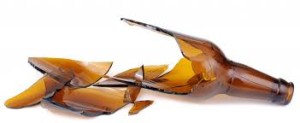I grew up in sort of a rural place in Ontario (that’s in Canada). High school dances were cool because there wasn’t much other entertainment, and when the weather got nice, field parties replaced the dances. When I was in high school I didn’t know that teenage drinking in a corn field cost vegetable processors lots of money. I just thought they were the source legendary stories and hangovers. 
In grad school, Doug included me on a couple of tours through southern Ontario to hang out with processing vegetable growers and visit the plants where their tomatoes, sweet corn and peas were frozen or canned. At one stop we talked to the plant QA and HACCP dudes and they showed us this impressive x-ray machine. Since processed vegetables have a kill step in the canning process and a blanching for frozen product, microbial contamination of incoming products isn’t that big of a deal. What these guys were concerned with was foreign objects picked up by mechanical harvesters – stuff like nails, rocks and broken glass.
The processors also knew some fields contained more glass than others — the ones adjacent to joy-ride routes where kids threw empties out of the car or where a field party had happened.
Broken glass in food sucks.
A UK company, Thortons, is recalling batches of Chocolates Smiles, due to the potential for broken glass (insert glass/teeth/smiles joke here).
As a precautionary measure, Thorntons PLC is recalling all batches of the above three products after small pieces of glass were found loose inside some jars. The recall only includes the chocolates sold in glass jars. Recall notices are being displayed in Thorntons shops advising consumers to return the products.
Product:
Pink Chocolate Smiles Jar, 135g; Milk Chocolate Smiles Jar, 135g; Milk Chocolate Smiles Jar, 350g.
